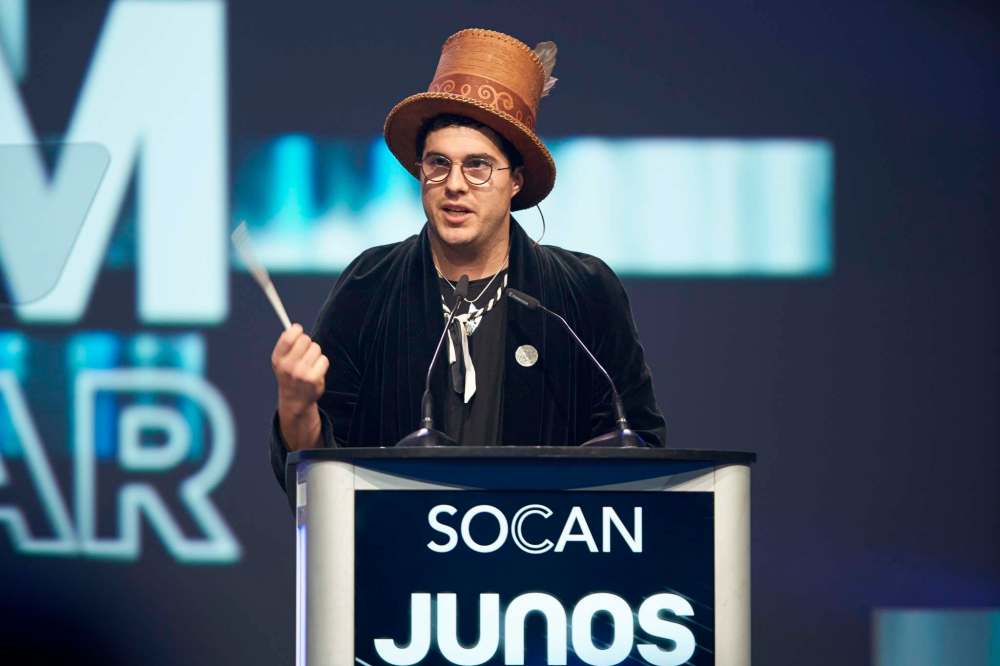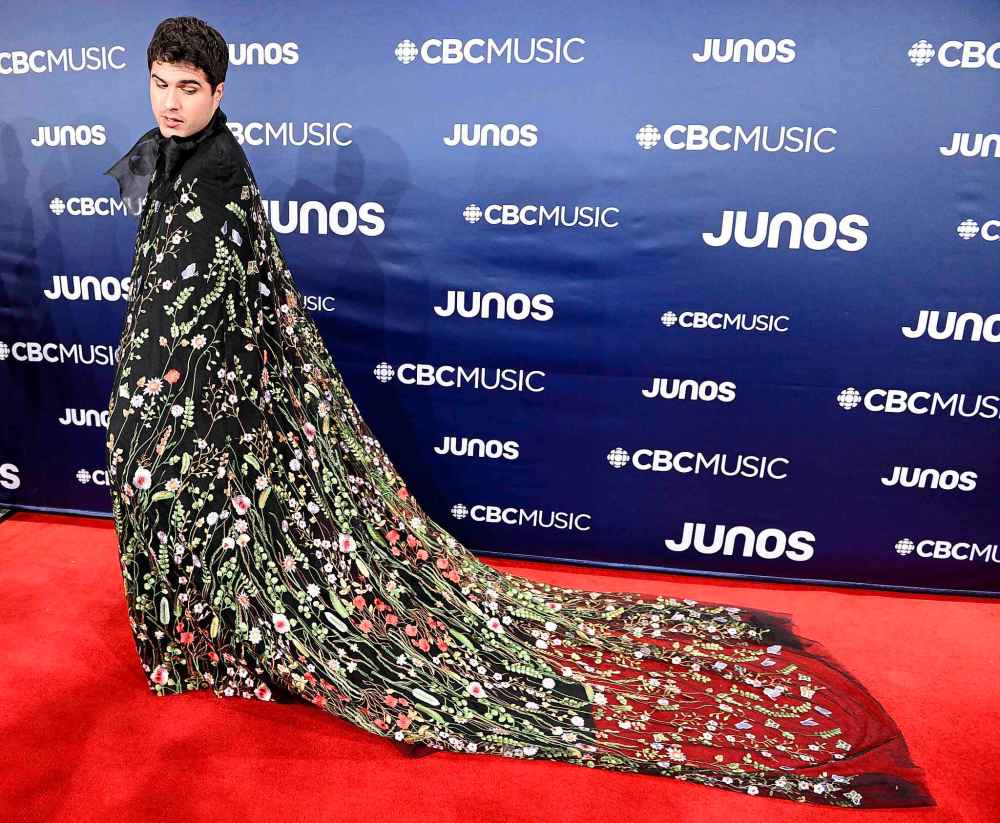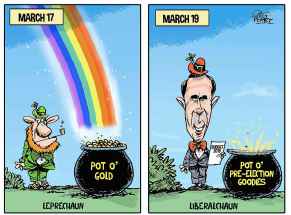Time to tear down the silos Indigenous music category has outlived its usefulness at Junos
Read this article for free:
or
Already have an account? Log in here »
To continue reading, please subscribe:
Monthly Digital Subscription
$0 for the first 4 weeks*
- Enjoy unlimited reading on winnipegfreepress.com
- Read the E-Edition, our digital replica newspaper
- Access News Break, our award-winning app
- Play interactive puzzles
*No charge for 4 weeks then price increases to the regular rate of $19.00 plus GST every four weeks. Offer available to new and qualified returning subscribers only. Cancel any time.
Monthly Digital Subscription
$4.75/week*
- Enjoy unlimited reading on winnipegfreepress.com
- Read the E-Edition, our digital replica newspaper
- Access News Break, our award-winning app
- Play interactive puzzles
*Billed as $19 plus GST every four weeks. Cancel any time.
To continue reading, please subscribe:
Add Free Press access to your Brandon Sun subscription for only an additional
$1 for the first 4 weeks*
*Your next subscription payment will increase by $1.00 and you will be charged $16.99 plus GST for four weeks. After four weeks, your payment will increase to $23.99 plus GST every four weeks.
Read unlimited articles for free today:
or
Already have an account? Log in here »
Hey there, time traveller!
This article was published 18/03/2019 (2462 days ago), so information in it may no longer be current.
The biggest moment from this year’s Juno Awards was not televised.

At Saturday night’s gala in London, Ont., when Wolastoqiyik singer/songwriter and classically trained tenor Jeremy Dutcher accepted the award for Indigenous Album of the Year for his stunning 2018 debut Wolastoqiyik Lintuwakonawa, he asked his fellow nominees — Elisapie Isaac, Snotty Nose Rez Kids, Leonard Sumner, and Northern Cree — to stand up.
“All of your work changes this place, and it deserves to be considered outside of this category,” he told them. “Because our music is not niche. Our music is saying something.”
He’s right, of course, and his words underscore a criticism many Indigenous artists have had about the Junos for years.
‘Indigenous’ is not a genre. Country is a genre. Pop is a genre. But Indigenous? That’s too broad a term to cover off the range of music that comes from talented artists who hail from diverse nations.
‘Indigenous’ is not a genre. Country is a genre. Pop is a genre. But Indigenous? That’s too broad a term to cover off the range of music that comes from talented artists who hail from diverse nations.
When the category was first introduced in 1994, thanks in large part to the advocacy of category co-creator Buffy Sainte-Marie, it played a critical role in providing a space to celebrate Indigenous artists who were too often overlooked by mainstream institutions such as the Junos.
But just as an Indigenous category can help amplify Indigenous artists, it can also hem them in.
2019 JUNO Award Winners
A selection of winners at the 2019 Juno awards.
A selection of winners at the 2019 Juno awards. To see the complete list, visit the Juno Awards website.
JUNO Fan Choice: Avril Lavigne
Single of the Year: In My Blood, Shawn Mendes
International Album of the Year: beerbongs & bentleys, Post Malone
Album of the Year: Shawn Mendes, Shawn Mendes
Artist of the Year: Shawn Mendes
Group of the Year: Arkells
Breakthrough Artist of the Year: bülow
Breakthrough Group of the Year: The Washboard Union
Country Album of the Year: We Were That Song, Brett Kissel
Adult Alternative Album of the Year: Earthtones, Bahamas
Alternative Album of the Year: Baby Teeth, Dizzy
Pop Album of the Year: Shawn Mendes, Shawn Mendes
Rock Album of the Year: Rally Cry, Arkells
Vocal Jazz Album of the Year: Laila Biali, Laila Biali
Jazz Album of the Year, Solo: Old Soul, Robi Botos
Jazz Album of the Year, Group: The Seasons of Being, Andy Milne & Dapp Theory
Rap Recording of the Year: LoVE me NOw, Tory Lanez
Dance Recording of the Year: Body, Loud Luxury
R&B/Soul Recording of the Year: Being Human In Public, Jessie Reyez
Electronic Album of the Year: Deception Bay, Milk & Bone
Metal/Hard Music Album of the Year: The Wake, Voivod
Adult Contemporary Album of the Year: Love, Michael Bublé
Comedy Album of the Year: Good Friend Bad Grammar, Dave Merheje
Reggae Recording of the Year: Sly & Robbie meet Dubmatix – Overdubbed, Dubmatix
Indigenous Music Album of the Year: Wolastoqiyik Lintuwakonawa, Jeremy Dutcher
Contemporary Roots Album of the Year: Both Ways, Donovan Woods
Traditional Roots Album of the Year: Sweet Old Religion, Pharis and Jason Romero
Blues Album of the Year: Miles To Go, Colin James
Instrumental Album of the Year: China Cloud, Gordon Grdina
Francophone Album of the Year: Une année record, Loud
Children’s Album of the Year: You, Me and the Sea, Splash’N Boots
World Music Album of the Year: Rapadou Kreyol, Wesli
In fact, it wasn’t until 2014 that A Tribe Called Red became the first Indigenous act to win an award outside the Indigenous album of the year category.
“There are no Indigenous nominees outside of the Indigenous music category and it’s not because we’re not putting out excellent music,” Dutcher told Q‘s Tom Power in an interview ahead of the Junos.
“So for me, it’s a bit of a double-edged sword — I wish that we weren’t siloed into one category.”
That siloing effect reflects a stubborn tendency among Canada’s cultural institutions to think about Indigenous art, in all disciplines, as a monolith, as well as in a past-tense, anthropological sense instead of something that is diverse, evolving, and contemporary.

Even the notion of an ‘Indigenous category’ seems antiquated and othering in 2019, in much the same way ‘world music’ does. Indigenous artists, too, make pop, rap, rock, country, folk, roots, alternative, and classical music.
Indigenous artists belong in every category, on every stage, because they belong, period.
Dutcher spoke about reconciliation during his powerful speech — or tried to anyway.
Shortly after addressing Prime Minister Justin Trudeau directly — “a nation-to-nation relationship does not look like pipelines. A nation-to-nation relationship does not look like sending militarized police force into unceded territory. And a nation-to-nation relationship does not look like, in 2019, our communities under boil-water advisories” — he was played off the stage, which is especially galling considering the Juno Awards’ Saturday night gala is not beholden to broadcast timelines.
https://www.youtube.com/watch?v=2mJ3LBODhGQ
And so, later in the night, after accepting their award for rock album of the year, the Arkells gave Dutcher their time.
“Our friend Jeremy didn’t get a chance to finish, so he’s going to finish the night as he should,” Arkells frontman Max Kerman said.
It wasn’t just a classy move on the part of the Arkells, it was a significant one. Acts of reconciliation can be as simple as passing the microphone, sharing a platform, knowing when to stand back and let someone else speak.
Acts of reconciliation can be as simple as passing the microphone, sharing a platform, knowing when to stand back and let someone else speak.
Reconciliation doesn’t come from silos and separation. It comes from working together and elevating each other.
“This is what holding space looks like,” Dutcher said when he returned to the stage.
He called reconciliation a lofty goal, a dream that “takes time. It takes stories. It takes shared experience. It takes music. I have hope. I have to. That we can come to right relations with each other.”
https://www.youtube.com/watch?v=wkHQfYMtpOI
jen.zoratti@freepress.mb.ca
Twitter: @JenZoratti

Jen Zoratti is a Winnipeg Free Press columnist and author of the newsletter, NEXT, a weekly look towards a post-pandemic future.
Our newsroom depends on a growing audience of readers to power our journalism. If you are not a paid reader, please consider becoming a subscriber.
Our newsroom depends on its audience of readers to power our journalism. Thank you for your support.










